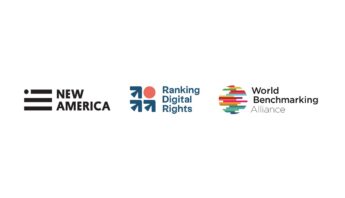Ranking Digital Rights (RDR) produces a Corporate Accountability Index that ranks the world’s most powerful internet, mobile, and telecommunications companies on their disclosed commitments and policies affecting freedom of expression and privacy. The RDR Index is a standard-setting tool aimed at encouraging companies to abide by international principles and standards safeguarding freedom of expression and privacy.
Read the 2020 RDR Index methodology.
The standards we use to measure companies build on more than a decade of work by the human rights, privacy, and security communities, described in greater detail below. Initial research and consultation for the RDR Index started in the second half of 2012. For more about the core concepts related to business and human rights, ICT and human rights, and the project’s “theory of change,” please see our Theory and Strategy overview. We also carried out research on best practices for corporate rankings in general as can be seen from our 2013 report on Elements of Successful Ranking Systems.
Developing the methodology
We believe that rigorous research, stakeholder consultation, and transparency about the methodology development process are vital if a ranking is to be credible and effective. Since its inception, RDR has engaged closely with researchers around the globe. The original RDR Index methodology was developed over three years of research, testing, consultation, and revision, in consultation with stakeholders across several project phases. Since then, given the fast-changing nature of the technology sector, we have continued to expand and improve the RDR Index methodology on a regular basis. Our methodology development and revision processes since the project’s inception until the present day are described in detail below. Initial case study research conducted in the second half of 2013 and early 2014 helped us answer key questions before starting to draft the methodology. Our Phase 1 Case Study Research report describes what we learned from that research, followed by summaries of each case study’s findings and recommendations. Parallel to the case study research we carried out consultations with civil society groups, activists, and journalists on a set of scenarios describing risks that they may face when using ICTs. Our Human Rights Risk Scenarios document raises key questions about company policies and practices in relation to those user risks. For the initial methodology development, the pilot study, and the inaugural RDR Index, we also partnered with Sustainalytics, a leading provider of ESG (environmental, social, and governance) research to investors. In 2015, RDR launched its inaugural RDR Index, which ranked 16 internet and telecommunications companies. Learn more about the 2015 research process. For the 2017 RDR Index, RDR expanded the ranking to 22 companies, which included all of the companies ranked in 2015 plus an additional six companies. In addition to internet and telecommunications companies, the RDR Index was expanded with new types of services, including those that produce software and devices that we call “mobile ecosystems.” As a result, the RDR team further revised the 2017 methodology based on a detailed review of the raw data from the 2015 RDR Index as well as consultations with stakeholders from civil society, academia, the investor community, and the companies themselves. Learn more about the 2017 research process. The 2018 RDR Index applied the same methodology to evaluate the same 22 companies as in the 2017 RDR Index. This enabled us to produce comparative analyses of each company’s performance and to track overall trends. Learn more about the 2018 research process. The 2019 RDR Index evaluates 24 companies, which includes all of the 22 companies previously evaluated plus an additional two companies. We also expanded our evaluation to include additional cloud services for five internet companies. Limited revisions were introduced to the 2019 RDR Index methodology in order to preserve year-on-year comparability. Learn more about the 2019 research process.
Upgrading and Expanding the RDR Index
In 2019 and 2020, we upgraded our methodology to address human rights harms associated with targeted advertising and algorithmic systems. We also adapted our methodology to include more company types, especially powerful global platforms with core e-commerce businesses such as Amazon and Alibaba. The fifth RDR Index will be published in early 2021 with the expanded methodology and scope. Learn more about the expansion of the 2020 RDR Index methodology.
[Last updated: 8 June 2020]



